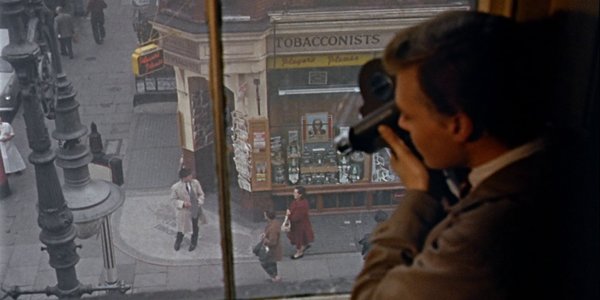3. Michael Powell - From British Film-making Giant To Relative Obscurity

Michael Powell is a director who, throughout a career of teaming with Emeric Pressburger, established himself as one of the most loved English film-makers of all time. Their astounding filmography, featuring some of the greatest British films ever made, included, amongst many others, A Matter of Life and Death, The Life and Death of Colonel Blimp, Black Narcissus and The Red Shoes. It is perhaps because of this, Powell thought he would be allowed some leeway to experiment with his film-making style and create something altogether new in his filmography. As the 1950s were ending, Powell realised the world, and cinema around him, was becoming a darker place and attempted to take his film-making in a similar path. His next feature, released without long-term collaborator Pressburger, was Peeping Tom - a dark, horror movie focusing on voyeurism and audience's collective responsibility for violence on screen. A young, demented film-maker stabbed a women he filmed with a sharp blade fixed onto the end of his camera. For people more familiar with Powell's life-affirming features, this was too much. Despite being championed by the likes of Martin Scorsese, Peeping Tom effectively drew a sad end to Powell's career - it was so attacked and vilified, his career was irreparably damaged.

Peeping Tom has since grown to be regarded as a classic movie and a rare horror movie with genuine ominous and social commentary. That it was released in the same year as Psycho, Eyes Without a Face and The Housemaid, shows that Powell was indeed on the ball, zeitgeist-wise, whether the British establishment wanted to admit it or not. That such a talented man was effectively banished from film-making in Britain is as sad a movie twist as one can imagine.
 Michael Powell is a director who, throughout a career of teaming with Emeric Pressburger, established himself as one of the most loved English film-makers of all time. Their astounding filmography, featuring some of the greatest British films ever made, included, amongst many others, A Matter of Life and Death, The Life and Death of Colonel Blimp, Black Narcissus and The Red Shoes. It is perhaps because of this, Powell thought he would be allowed some leeway to experiment with his film-making style and create something altogether new in his filmography. As the 1950s were ending, Powell realised the world, and cinema around him, was becoming a darker place and attempted to take his film-making in a similar path. His next feature, released without long-term collaborator Pressburger, was Peeping Tom - a dark, horror movie focusing on voyeurism and audience's collective responsibility for violence on screen. A young, demented film-maker stabbed a women he filmed with a sharp blade fixed onto the end of his camera. For people more familiar with Powell's life-affirming features, this was too much. Despite being championed by the likes of Martin Scorsese, Peeping Tom effectively drew a sad end to Powell's career - it was so attacked and vilified, his career was irreparably damaged.
Michael Powell is a director who, throughout a career of teaming with Emeric Pressburger, established himself as one of the most loved English film-makers of all time. Their astounding filmography, featuring some of the greatest British films ever made, included, amongst many others, A Matter of Life and Death, The Life and Death of Colonel Blimp, Black Narcissus and The Red Shoes. It is perhaps because of this, Powell thought he would be allowed some leeway to experiment with his film-making style and create something altogether new in his filmography. As the 1950s were ending, Powell realised the world, and cinema around him, was becoming a darker place and attempted to take his film-making in a similar path. His next feature, released without long-term collaborator Pressburger, was Peeping Tom - a dark, horror movie focusing on voyeurism and audience's collective responsibility for violence on screen. A young, demented film-maker stabbed a women he filmed with a sharp blade fixed onto the end of his camera. For people more familiar with Powell's life-affirming features, this was too much. Despite being championed by the likes of Martin Scorsese, Peeping Tom effectively drew a sad end to Powell's career - it was so attacked and vilified, his career was irreparably damaged.  Peeping Tom has since grown to be regarded as a classic movie and a rare horror movie with genuine ominous and social commentary. That it was released in the same year as Psycho, Eyes Without a Face and The Housemaid, shows that Powell was indeed on the ball, zeitgeist-wise, whether the British establishment wanted to admit it or not. That such a talented man was effectively banished from film-making in Britain is as sad a movie twist as one can imagine.
Peeping Tom has since grown to be regarded as a classic movie and a rare horror movie with genuine ominous and social commentary. That it was released in the same year as Psycho, Eyes Without a Face and The Housemaid, shows that Powell was indeed on the ball, zeitgeist-wise, whether the British establishment wanted to admit it or not. That such a talented man was effectively banished from film-making in Britain is as sad a movie twist as one can imagine.